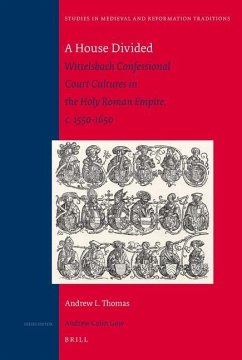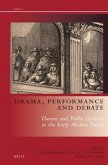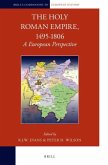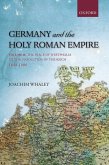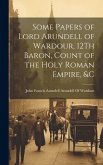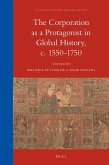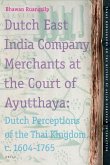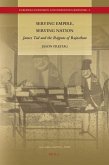This book examines the intersection between religious belief, dynastic ambitions, and late Renaissance court culture within the main branches of Germany's most storied ruling house, the Wittelsbach dynasty. Their influence touched many shores from the "coast" of Bohemia to Boston.
This book is the only book-length monograph comparing the impact of confessional identity on both halves of the Wittelsbach dynasty which provided Bavarian dukes and German emperors as well as its implications for late Renaissance court culture. It demonstrates that religious conflict led to the development of distinctly confessional court cultures among the main Wittelsbach courts. Likewise, it illuminates how these confessional court cultures contributed significantly to the splintering of Renaissance humanism along religious lines in this era. Concomitantly, it sheds new light on the impact of late medieval dynastic competition on shaping the early modern Wittelsbach courts as well as the important role of Wittelsbach women in the creation and continuation of dynastic piety in their roles as wives, mothers, and patronesses of the arts.
Hinweis: Dieser Artikel kann nur an eine deutsche Lieferadresse ausgeliefert werden.
This book is the only book-length monograph comparing the impact of confessional identity on both halves of the Wittelsbach dynasty which provided Bavarian dukes and German emperors as well as its implications for late Renaissance court culture. It demonstrates that religious conflict led to the development of distinctly confessional court cultures among the main Wittelsbach courts. Likewise, it illuminates how these confessional court cultures contributed significantly to the splintering of Renaissance humanism along religious lines in this era. Concomitantly, it sheds new light on the impact of late medieval dynastic competition on shaping the early modern Wittelsbach courts as well as the important role of Wittelsbach women in the creation and continuation of dynastic piety in their roles as wives, mothers, and patronesses of the arts.
Hinweis: Dieser Artikel kann nur an eine deutsche Lieferadresse ausgeliefert werden.
"Andrew Thomas's book deserves high merit for its comprehensive treatment, based on a broad range of sources, and for its mastery of several bodies of scholarly literature. The theme of the two Wittelsbach branches as dynastic and territorial rivals, and as representatives of the religious fragmentation of the German lands, is not a new discovery. Andrew Thomas gives it, however, an original and comprehensive treatment that is surely both new and valuable. His highly interesting, challenging book engages many of the principal themes of German history in what has come to be called the confessional age."
Thomas A. Brady, Jr., University of California, Berkeley. In: Sixteenth Century Journal , Vol. 42, No. 1 (2012), pp. 181-182.
"Die Dissertation ist gut recherchiert. Ihre Ergebnisse werden im überlegten Aufbau und formal einwandfreier Form niedergelegt. Die Ausführungen sind durch einen hinreichenden, jedoch nicht überbordenden Anmerkungsapparat hilfreich untermauert. [...] Insgesamt ist eine Untersuchung gelungen, die Wissenschaftlichkeit, Lesbarkeit und Benutzbarkeit gekonnt miteinander verbindet. Das originell ansetzende, inhaltlich anregende und formal rundum gefällige Buch stellt einen anregenden und weiterführenden Beitrag der interdisziplinär arbeitenden Kulturgeschichte zur Reformationsforschung dar."
Alois Schmid, Ludwig-Maximilians-Universität München. In: Francia-Recensio 2012.
"More than just a study of one dynasty, with its emphasis on political, cultural and religious history, A house divided reflects the dynamism of Europe in the early modern world."
Amy K. Bosworth, Muskingum University, New Concord, Ohio. In: The Journal of Ecclesiastical History , Vol. 63, No. 1 (January 2012), pp. 165-166.
"This is an exciting study, with an innovative and cross-disciplinary approach."
Jonathan Spangler, Manchester Metropolitan University. In: European Review of History , Vol. 18, No. 4 (October 2011), pp. 581-583.
"Eine wertvolle Studie sowohl zur Geschichte des Hauses Wittelsbach wie auch zur Geistes- und Kulturgeschichte Mitteleuropas in jener Sattelzeit des 16./17. Jahrhunderts."
Josef Johannes Schmid, Johannes Gutenberg-Universität Mainz. In: A href="11 (2011), Nr. 3 [15.03.2011].
Thomas A. Brady, Jr., University of California, Berkeley. In: Sixteenth Century Journal , Vol. 42, No. 1 (2012), pp. 181-182.
"Die Dissertation ist gut recherchiert. Ihre Ergebnisse werden im überlegten Aufbau und formal einwandfreier Form niedergelegt. Die Ausführungen sind durch einen hinreichenden, jedoch nicht überbordenden Anmerkungsapparat hilfreich untermauert. [...] Insgesamt ist eine Untersuchung gelungen, die Wissenschaftlichkeit, Lesbarkeit und Benutzbarkeit gekonnt miteinander verbindet. Das originell ansetzende, inhaltlich anregende und formal rundum gefällige Buch stellt einen anregenden und weiterführenden Beitrag der interdisziplinär arbeitenden Kulturgeschichte zur Reformationsforschung dar."
Alois Schmid, Ludwig-Maximilians-Universität München. In: Francia-Recensio 2012.
"More than just a study of one dynasty, with its emphasis on political, cultural and religious history, A house divided reflects the dynamism of Europe in the early modern world."
Amy K. Bosworth, Muskingum University, New Concord, Ohio. In: The Journal of Ecclesiastical History , Vol. 63, No. 1 (January 2012), pp. 165-166.
"This is an exciting study, with an innovative and cross-disciplinary approach."
Jonathan Spangler, Manchester Metropolitan University. In: European Review of History , Vol. 18, No. 4 (October 2011), pp. 581-583.
"Eine wertvolle Studie sowohl zur Geschichte des Hauses Wittelsbach wie auch zur Geistes- und Kulturgeschichte Mitteleuropas in jener Sattelzeit des 16./17. Jahrhunderts."
Josef Johannes Schmid, Johannes Gutenberg-Universität Mainz. In: A href="11 (2011), Nr. 3 [15.03.2011].

